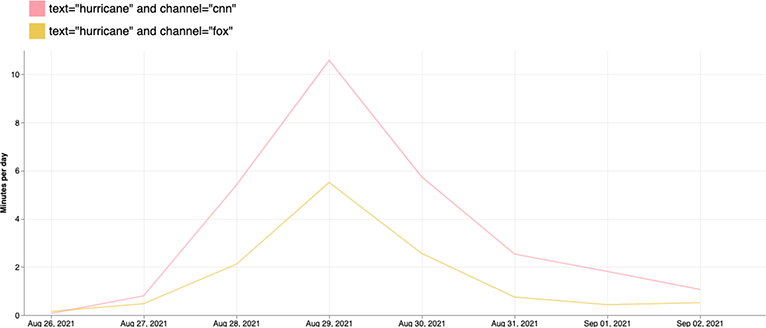Hurricane Ida and The Need for Better Climate Communication
By David M. Markowitz
The events of the past week, particularly related to Hurricane Ida, are another reminder that we are intimately connected to nature and the environment. Our poor treatment of the environment is directly linked to more severe storms, and our infrastructure is currently unprepared to withstand them.
One should expect a severe storm like Hurricane Ida—which made landfall in Louisiana nearly 16 years to the day that Hurricane Katrina devastated the same area—to resurface the conversation around mitigating climate change and its effects. This starts with the news, which can impact what people watch and what they care about.
Let’s look at the past week’s TV news coverage and how much time was dedicated to discussing Hurricane Ida. Note, these data were obtained from the Stanford Cable TV News Analyzer.
The figure above shows how often the term “hurricane” was spoken on two cable TV networks, CNN and Fox. The term “hurricane” was a major focus on August 29, 2021 as the storm made landfall—more so on CNN than Fox—but then it was gradually removed from the news cycle.
Did mentions of climate change show a similar pattern?
From this figure, as Hurricane Ida became more of a problem, CNN tended to focus more on climate change than Fox. However, the amount of time that both networks focused on climate change is limited and worrisome.
When a disaster like a hurricane occurs, news outlets need to be vigilant and focus on at least two news items simultaneously: (1) the devastation and relief efforts, and (2) the root cause of such disasters, followed by making recommendations to improve our relationship to the environment. Weather experts are often celebrated on TV because they help to explain how a storm occurs in real time. We need climate experts to accompany them, explaining why the storm occurred and what we can do to improve our climate future.
Making climate change central to each disaster might be one way to increase the public’s concern for the environment.
Dr. David M. Markowitz is an assistant professor in the School of Journalism and Communication at the University of Oregon. He uses language patterns from natural databases to infer what people are thinking, feeling, and experiencing psychologically.
Photograph of Hurricane Ida by European Space Agency CC BY-NC 2.0



